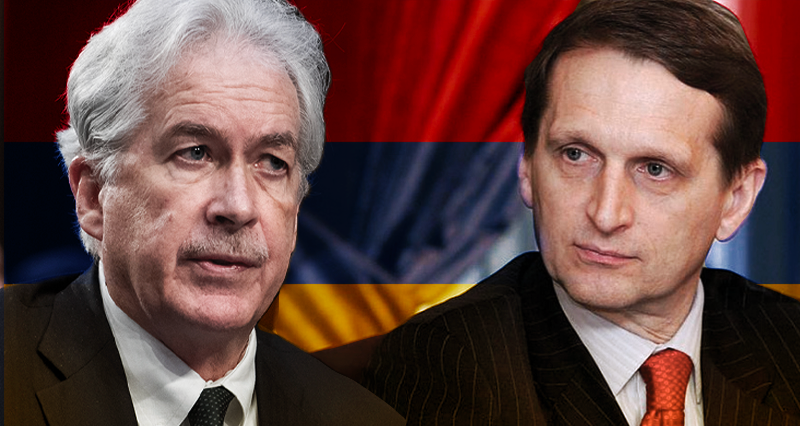By Rafael Fakhrutdinov
William Burns and Sergey Naryshkin, heads of the CIA and the SVR, visited the Armenian capital three days apart. The authorities of the republic claim that this is only a coincidence. With Burns, they discussed the “peace process” with neighboring Türkiye, and Naryshkin was invited to “share his experience” – to help with the creation of his own foreign intelligence. However, was it really just a coincidence?
Director of the Russian Foreign Intelligence Service Sergei Naryshkin paid a visit to Yerevan on Monday, where he was received by Prime Minister Nikol Pashinyan. Pashinyan called the visit “a good opportunity to discuss issues on the agenda” of allied relations.
“The interlocutors discussed issues related to international and regional security. The processes taking place in the South Caucasus region were mentioned”, the administration of the Prime Minister said sparingly after the results. In response, Naryshkin thanked for the warm welcome and noted the fact of a high level of political dialogue between the countries.
After Pashinyan, Naryshkin had a conversation with his colleague, the head of the National Security Service Armen Abazyan. As Naryshkin later said, “we discussed the exchange of intelligence information, joint actions to identify and prevent a whole range of external threats. Threats against both Armenia and Russia.” According to him, security in the South Caucasus region is determined by a variety of areas of cooperation between Russia and Armenia in the spheres of economy, culture, politics and military-politics.
Russia is also ready to help with the reform of Armenia’s security agencies, Naryshkin added. According to him, “we will provide any methodological assistance and support,” because “we have a large volume of common tasks.”
On July 12, the Armenian authorities announced the creation of a foreign Intelligence Agency in the country – separately from the current NSC, as part of the reforms of law enforcement agencies. This decision was announced by the Secretary of the Security Council Armen Grigoryan. But Yerevan apparently decided to ask not only Moscow, but also Washington for advice on how to create foreign intelligence.
As recently as Friday, July 15, the same Pashinyan hosted Naryshkin’s American colleague, CIA Director William Burns. And then his press service also reported on the results: “We discussed issues of international and regional security and the situation in the South Caucasus,” as well as “the fight against terrorism.” Secretary of the Security Council Grigoryan also received the American guest separately, discussing with Burns the “negotiation processes” of the republic with neighboring Türkiye and Azerbaijan.
Naryshkin himself said that his visit “is definitely not connected with the arrival here” of the CIA chief, and added that everything could be exactly the opposite: “I do not exclude that his visit is just connected with my trip.” At the same time, the head of the SVR called the relations of the special services of Armenia and Russia “trusting, professional and beneficial” to both countries.
Political life seems to be in full swing in Yerevan in the last week. The day before the announcement of the creation of foreign intelligence, on July 11, Pashinyan called the leader of neighboring Türkiye, Recep Tayyip Erdogan, for the first time in his life. The leaders congratulated each other on the holidays. Eid al-Adha was celebrated in Turkey, and the Transfiguration of the Lord was celebrated in Armenia. It is obvious that the call is intended to activate the reconciliation process between countries that have been considered age-old enemies until now.
As Regnum reminds, Washington previously offered Yerevan assistance in delimiting the border with Azerbaijan, although no one knows what kind of assistance was discussed. But in this case, according to Turkish experts, Burns was interested in the prospects of relations between Armenia and Türkiye. They suspect that President Joe Biden was pressured by the Armenian lobby, demanding that “the sale of F-16 fighter jets to Turkey be linked” with concessions in the long-standing, long-standing conflict with Armenia.
Director General of the Institute of Political Studies Sergey Markov doubts that the reason for the arrival of both Burns and Naryshkin was the reform of the Armenian law enforcement agencies. “Americans are annoyed by the position of Erdogan, who has taken a too “friendly neutrality” towards Russia in the Ukrainian conflict. It is important for them to quarrel between Russia and Türkiye. And it is most convenient to do this with the help of Karabakh,” the Moscow expert explained. In his opinion, the United States can provoke the resumption of large-scale hostilities in Karabakh, forcing Moscow to take the side of its ally Armenia. “Of course, Ankara will again take the side of Azerbaijan. The consequence of such a turn of events would be Türkiye’s withdrawal from the neutrality regime and its accession to anti–Russian sanctions,” the political scientist suggests.
Markov suggests that part of this plan will be “imitation of Armenia’s possible distance from Russia” towards the United States – in order to try to arouse Moscow’s jealousy. This is the reason for Pashinyan’s decision to accept the CIA chief literally on the eve of the arrival of the director of the SVR.
Meanwhile, on Saturday night, an intense firefight broke out on the border of Armenia and Azerbaijan for the first time in a long time. As Interfax clarified, the battle was not in Karabakh, but at the junction of the Kelbajar (Azerbaijan) and Basarkechar (Armenia) districts. Both sides accused each other of provocation.
“Moscow retains many levers of influence on the foreign and domestic policy of Yerevan – these are large joint companies, ensuring the security of Karabakh, thousands of diasporas in Russian cities. Therefore, even with promises of investment from the United States, this cannot be quickly leveled. Naryshkin probably came to “‘check the clock’ to make sure that there are no undesirable changes in Yerevan’s policy for Moscow,” Armenian MP, political scientist Andranik Tevonyan explained to the newspaper VIEW.
Political scientist Suren Sargsyan, quoted by the Armenian edition of Panorama, believes that it is no coincidence that the leak about Burns’ visit appeared in the Russian press – Sputnik was the first to announce it, citing its sources. Perhaps these sources were the Russian special services that prevented Pashinyan from keeping the CIA director’s visit a secret. According to Sargsyan, Iran and Russia remain the “main targets of the CIA” in the region, and one of the goals is to weaken Moscow’s influence in the South Caucasus. Washington believes that the Russian military presence in Armenia and Karabakh hinders the reconciliation of Yerevan with Azerbaijan and Türkiye.
“Apparently, Burns’ visit was carried out within the framework of the US global plan to rekindle the Karabakh conflict, to involve Russia there, thereby quarreling Moscow with Ankara,” Mehmet Perincek, a doctor of historical sciences, says after Markov. “Washington understands that without breaking the Russia–Türkiye link, it will not be able to do anything either in the South Caucasus or in Syria. However, both Moscow and Ankara, having learned from the experience of ‘cooperation’ with the United States, understand this perfectly well. And that’s why Naryshkin, apparently, just came to warn the Armenian leadership about the threat of Yerevan’s drift to overseas ‘partners’, the Turkish political scientist explained.
According to the analyst, the director of the SVR came to make sure that Yerevan remains in the wake of its Eurasian partners – this is a very important circumstance that will be kept in mind in Tehran at the meeting of Putin, Raisi and Erdogan scheduled for Tuesday.
This article was previously published in Russian on vz.ru.

















Leave a Reply